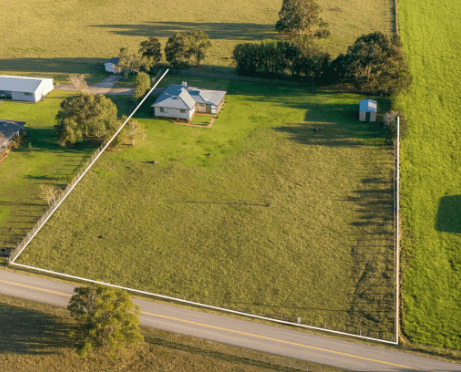Owning a property without direct road access can create complex and often costly legal challenges for both landowners and their neighbors. Studies estimate that a surprising number of rural parcels lack legally recorded access, raising the critical question: Can you deny access to landlocked property? While the immediate answer may seem like it should be yes, the law often provides pathways for access through concepts such as easements by necessity or prescriptive easements. Establishing these rights can take months and incur thousands of dollars in legal fees, and industry data suggest that access disputes are a common reason real estate deals fall through, alongside financing and title defects. Navigating recorded rights-of-way, seller disclosure requirements, and neighbor negotiations adds another layer of difficulty. For owners facing this situation, the question isn’t just “can you deny access to landlocked property?” but also “what is the fastest, most certain way to resolve this?” Renowned real estate investors Steve Daria and Joleigh specialize in helping owners bypass these hurdles. As land buyers for cash, they simplify the process, providing a clear path forward without the typical delays. To understand your options and receive a fair cash offer, book a free, no-obligation discussion today.
Key Points
- Access is Not Always Guaranteed: While a landowner can generally deny entry to their property, the law often provides access for landlocked parcels through easements. These can be formal recorded rights-of-way, established by historical use (prescriptive easements), or legally required for necessity, which means you may not be able to block a neighbor.
- Access Directly Impacts Property Value and Salability: A property without clear, legal access is difficult to finance and may be ineligible for title insurance, significantly reducing its value. Sellers must disclose access issues, as failure to do so can lead to legal disputes after the sale closes.
- Resolving Access Disputes is Costly and Time-Consuming: Establishing an easement through negotiation or court action can take months or even years, and it often incurs thousands of dollars in legal and survey fees. Negotiations frequently fail due to disagreements over location, maintenance responsibilities, or compensation for access.
- Proper Documentation is Essential: The only way to be certain about access rights is through a professional title search and a new property survey. These documents will reveal any recorded easements and identify potential boundary or access issues that may not be immediately apparent.
- You Have Several Practical Options: Talk to your neighbors, check your title policy, and consult a real estate attorney for guidance. If the process seems too complex or costly, consider selling to an experienced cash buyer, as they can often purchase properties despite access challenges.
What does it mean when a property is landlocked?
When a property is landlocked, it means the parcel has no legal right to access a public road without crossing over another person’s land.
This differs from simply lacking a driveway, as even visible dirt paths or trails do not constitute legal access unless they are officially recorded in property records.
Legal access is typically established through a formal document called an easement, which grants the right to travel across a neighboring property.

Depending on state law, access may also be created through an easement by necessity or by establishing prescriptive rights from long-term, open use.
Lenders and title insurance companies almost always require proven legal access before they will finance a purchase or insure a title, which heavily impacts the property’s value.
The situation often leads to the question: Can you deny access to landlocked property? Before planning any improvements or listing your property for sale, it is wise to order a professional title search and review property surveys to confirm your access rights.
If you find that your property is landlocked and are concerned about the time or cost to resolve the issue, seeking guidance from a real estate attorney or an experienced cash buyer is a practical next step.
Get Started: Get Your Cash Offer Below…
We are direct land buyers. There are no commissions or fees and no obligation whatsoever. Start below by sharing where your property is and where we can send your offer…
Can you legally deny access to someone with a landlocked property?
While property owners generally control who enters their land, the law often creates exceptions for landlocked parcels, making the answer complex.
You can typically deny access if no formal, recorded easement exists; however, this action may trigger a lawsuit, where a court could grant access.
Courts frequently establish an “easement by necessity” to ensure a property is not rendered useless, or they may recognize a “prescriptive easement” from long-term, open use.
When a judge intervenes, they consider fairness, prior use, and the most practical route, often setting rules for maintenance and cost-sharing.
The core question becomes less about whether you can deny access and more about the potential legal consequences.
Blocking a known, recorded easement can lead to court orders and financial penalties, so simply asking, “Can you deny access to landlocked property?” overlooks the risks.
Before taking any action, such as installing a gate, it is crucial to document all communications, order a title search to verify recorded rights, and seek professional legal advice.
To save time and avoid costly court battles, consider attempting to negotiate a formal agreement or using a mediator as a first step.
What are the legal rights of landlocked property owners?
- Right to Seek an Easement by Necessity: Landlocked owners have the right to sue for an “easement by necessity,” asking a court to grant legal access across a neighboring property. The court will determine the most reasonable route to ensure the land is not left unusable.
- Ability to Claim a Prescriptive Easement: If you or previous owners have used a path openly and continuously for many years, you may have the right to a prescriptive easement. This essentially formalizes historical use into a permanent legal right, even without a written agreement.
- Power to Negotiate a Formal Agreement: You have the right to negotiate a private, recorded easement with a neighbor, which is often the fastest and cheapest solution. This written contract should clearly define the route, width, and responsibilities for maintenance, as well as the associated costs.
- Right to Uncover Existing Access: Before assuming you are landlocked, you have the right to perform a title search and order a survey to uncover any forgotten or unrecorded easements. A legal right-of-way may already exist, even if it is not immediately evident upon visually inspecting the property.
- Remedies for Blocked Legal Access: If a neighbor illegally blocks a recorded easement, your rights are clear, even if they ask, “Can you deny access to landlocked property?” You can seek a court injunction to force them to remove the obstruction, and you may be able to sue for damages.
What documents should I gather before talking to an attorney or title company?
Before meeting with an attorney or title company about an access issue, gathering key documents will save time and money.
Start with your current deed, any prior deeds you have, and the full legal description of your property.
You should also find your owner’s title insurance policy and copies of any recorded easements or private agreements related to access.
A recent survey or even a simple hand-drawn sketch showing the property, its boundaries, and the path you use is also very helpful.
Having clear records helps professionals quickly assess the situation and answer complex questions, such as, “Can you deny access to landlocked property?”
Also, bring any photos of the access route, correspondence with neighbors, relevant permits, HOA rules, and county tax parcel records.
Organize these materials using a simple timeline of ownership and access history, and bring your ID and contact information for all parties involved.
A short summary letter explaining the issue can provide essential clarity and help reduce your legal fees.
What are typical costs and timelines to formalize an easement, and who pays for maintenance?
- Costs for a Negotiated Easement: A negotiated easement is the most cost-effective option, ranging from $1,300 to $6,300. This includes attorney fees for drafting ($500–$3,000), a land survey ($600–$2,500), and title work with recording fees ($200–$800).
- Timeline for a Negotiated Agreement: Without disputes, a negotiated easement takes 2 to 8 weeks to complete. The timeline depends on how quickly you and your neighbor agree on terms, schedule a survey, and file documents.
- Costs and Timelines for Court Action: If negotiations fail, a court-ordered easement by necessity can cost $ 5,000 to $20,000 or more and take 3 to 9 months. This explains why denying access to landlocked property can lead to significant legal expenses.
- Who Pays for Maintenance? Shared road or path maintenance costs are typically split. A clear easement agreement defines responsibilities, preventing repair disputes that can range from $100 to over $1,000 annually.
- Factors That Influence Final Costs: Total costs and timelines vary significantly based on location, property complexity, and the level of cooperation between the parties. Disagreements over the easement’s route or compensation will significantly increase both the time and cost.

Can you sell a landlocked property without legal access?
Yes, you can sell a landlocked property without legal access, but it significantly narrows your options and reduces the property’s value.
Most traditional buyers, lenders, and title insurance companies require clear, recorded access before they will close a deal, which significantly reduces your buyer pool.
Your best options are to either resolve the access issue before listing or find a buyer willing to take on the challenge.
You can try to negotiate and record a formal easement with a neighbor or pursue a court-ordered easement by necessity, but both take time and money.
Some sellers choose to disclose the issue upfront and price the property accordingly, which often attracts cash buyers.
This situation raises the question for neighbors: Can you deny access to landlocked property? To avoid delays, order a title search and survey early.
For a straightforward solution, expert real estate investors and seasoned land buyers, Steve Daria and Joleigh, can help.
They specialize in these complex situations and can provide a fair cash offer without the typical financing hurdles.
Book a free, no-obligation discussion today to review your options and gain clarity on your timeline.
**NOTICE: Please note that the content presented in this post is intended solely for informational and educational purposes. It should not be construed as legal or financial advice or relied upon as a replacement for consultation with a qualified attorney or CPA. For specific guidance on legal or financial matters, readers are encouraged to seek professional assistance from an attorney, CPA, or other appropriate professional regarding the subject matter.
